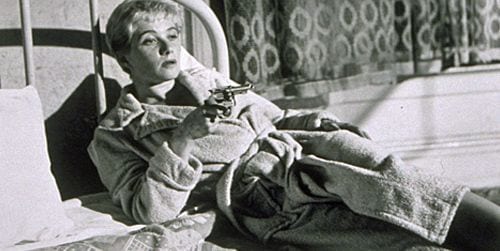
There’s something wonderfully self-aware about Mike Hammer’s (Ralph Meeker) reaction to Christina (Cloris Leachman) when she runs out in front of his car in the first scene of Kiss Me Deadly. There’s more disdain than anger in his look as he tells her to get in the car. It’s a sign that he, like the audience, knows that this unforeseen and unwilled event will leave its mark on his future and at the same time, displays a resignation to fortune that is so typical, if rarely so explicitly addressed by the characters, of film noir. On top of that, it’s the first of many examples of unique greatness in this Criterion-reissued classic.
Hammer picks Christina up and agrees to drop her off at the first bus stop in Los Angeles. Of course, they never get there. They are cut off mid-route, and taken away to an unknown location where she is tortured, he drugged or kept unconscious, and then thrown off the side of the highway in a faked car accident. She dies but he, a private eye, survives to investigate the mystery. The rest of the movie shows him pulling on a thread to find a string and get the rope, as his assistant and lover Velda characterizes the investigation later in the film.
This classic film could merit a whole book, so I’ll just mention a couple of things. First, the gorgeous cinematography, which looks its best in this Criterion edition. The long shadows and dark corners of noir are all there, of course. So are beautiful shots from afar, often with the camera placed high up in the corner of the room, looking down on the characters as if they’re being watched. In a movie about an ever expanding conspiracy, this has a disquieting effect on the audience. It emphasizes the growing loss of control; as the film proceeds and the characters stand far out of reach on screen, the inability to reach out and stop the events on screen just gets further highlighted.
Thematically, Kiss Me Deadly both exemplifies and expands the film noir genre. Save for a few unfortunately naïve ones, all the characters in the film know that everyone has an ulterior motive, that no one says what they mean or means what they say. They talk in double entendres and innuendos, trying to lure others into their nets, all while being lured themselves. In this sense, the genre has rarely been done so intelligently.
At the same time, Kiss Me Deadly takes the standard film noir tropes – the deep fatalism, unraveling conspiracies, and femme fatales, the insatiable but potentially dangerous curiosity of the main character – and raises them to a new metaphorical level. There may be movies that can compete with Kiss Me Deadly for being prototypes of film noir, but none have used the genre for such lofty ideas as those that come out in the film’s ending.
Criterion not only gives you the classic film with this DVD. It enhances the experience with all the analysis, context, and information you might need. The controversial but essential altered ending, which was the only one known to exist until the original one was discovered in 1997, is included, as is director Robert Aldrich’s essay from 1955 defending the movie for its overt violence. Contemporary essays and documentaries relating to the film fill out the package even more. If you haven’t seen Kiss Me Deadly, such a supply of extras shouldn’t be needed to change that; it sure is an added pleasure, though.

![Call for Papers: All Things Reconsidered [MUSIC] May-August 2024](https://www.popmatters.com/wp-content/uploads/2024/04/all-things-reconsidered-call-music-may-2024-720x380.jpg)



